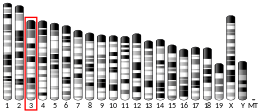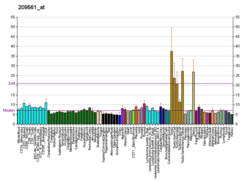Thrombospondin 3
Thrombospondin-3 (TSP3) is a protein that in humans is encoded by the THBS3 gene.[5][6]
The protein encoded by this gene belongs to the thrombospondin family. Thrombospondin family members are adhesive glycoproteins that mediate cell-to-cell and cell-to-matrix interactions. TSP3 has been found to be involved in the regulation of skeletal maturation.[7] This protein forms a pentameric molecule linked by a single disulfide bond. This gene shares a common promoter with metaxin 1.[6]
References
- GRCh38: Ensembl release 89: ENSG00000169231 - Ensembl, May 2017
- GRCm38: Ensembl release 89: ENSMUSG00000028047 - Ensembl, May 2017
- "Human PubMed Reference:". National Center for Biotechnology Information, U.S. National Library of Medicine.
- "Mouse PubMed Reference:". National Center for Biotechnology Information, U.S. National Library of Medicine.
- Vos HL, Devarayalu S, de Vries Y, Bornstein P (Jul 1992). "Thrombospondin 3 (Thbs3), a new member of the thrombospondin gene family". J Biol Chem. 267 (17): 12192–6. PMID 1601886.
- "Entrez Gene: THBS3 thrombospondin 3".
- Hankenson, Kurt (July 2005). "Mice with a Disruption of the Thrombospondin 3 Gene Differ in Geometric and Biomechanical Properties of Bone and Have Accelerated Development of the Femoral Head". Molecular and Cellular Biology. 25 (13): 5599–5606. doi:10.1128/MCB.25.13.5599-5606.2005. PMC 1156967. PMID 15964815. Retrieved 24 February 2015.
Further reading
- O'Rourke KM, Laherty CD, Dixit VM (1993). "Thrombospondin 1 and thrombospondin 2 are expressed as both homo- and heterotrimers". J. Biol. Chem. 267 (35): 24921–4. PMID 1459996.
- Adolph KW, Long GL, Winfield S, et al. (1995). "Structure and organization of the human thrombospondin 3 gene (THBS3)". Genomics. 27 (2): 329–36. doi:10.1006/geno.1995.1050. PMID 7558000.
- Qabar A, Derick L, Lawler J, Dixit V (1995). "Thrombospondin 3 is a pentameric molecule held together by interchain disulfide linkage involving two cysteine residues". J. Biol. Chem. 270 (21): 12725–9. doi:10.1074/jbc.270.21.12725. PMID 7759526.
- Maruyama K, Sugano S (1994). "Oligo-capping: a simple method to replace the cap structure of eukaryotic mRNAs with oligoribonucleotides". Gene. 138 (1–2): 171–4. doi:10.1016/0378-1119(94)90802-8. PMID 8125298.
- Qabar AN, Lin Z, Wolf FW, et al. (1994). "Thrombospondin 3 is a developmentally regulated heparin binding protein". J. Biol. Chem. 269 (2): 1262–9. PMID 8288588.
- Bornstein P, Devarayalu S, Edelhoff S, Disteche CM (1993). "Isolation and characterization of the mouse thrombospondin 3 (Thbs3) gene". Genomics. 15 (3): 607–13. doi:10.1006/geno.1993.1114. PMID 8468055.
- Winfield SL, Tayebi N, Martin BM, et al. (1997). "Identification of three additional genes contiguous to the glucocerebrosidase locus on chromosome 1q21: implications for Gaucher disease". Genome Res. 7 (10): 1020–6. doi:10.1101/gr.7.10.1020. PMC 310674. PMID 9331372.
- Suzuki Y, Yoshitomo-Nakagawa K, Maruyama K, et al. (1997). "Construction and characterization of a full length-enriched and a 5'-end-enriched cDNA library". Gene. 200 (1–2): 149–56. doi:10.1016/S0378-1119(97)00411-3. PMID 9373149.
- Adolph KW (1999). "Relative abundance of thrombospondin 2 and thrombospondin 3 mRNAs in human tissues". Biochem. Biophys. Res. Commun. 258 (3): 792–6. doi:10.1006/bbrc.1999.0710. PMID 10329465.
- Adolph KW, Bornstein P (2000). "The human thrombospondin 3 gene: analysis of transcription initiation and an alternatively spliced transcript". Mol. Cell Biol. Res. Commun. 2 (1): 47–52. doi:10.1006/mcbr.1999.0148. PMID 10527891.
- Carron JA, Hiscott P, Hagan S, et al. (2001). "Cultured human retinal pigment epithelial cells differentially express thrombospondin-1, -2, -3, and -4". Int. J. Biochem. Cell Biol. 32 (11–12): 1137–42. doi:10.1016/S1357-2725(00)00065-0. PMID 11137453.
- Armstrong DJ, Hiscott P, Batterbury M, Kaye S (2002). "Corneal stromal cells (keratocytes) express thrombospondins 2 and 3 in wound repair phenotype". Int. J. Biochem. Cell Biol. 34 (6): 588–93. doi:10.1016/S1357-2725(01)00157-1. PMID 11943589.
- Strausberg RL, Feingold EA, Grouse LH, et al. (2003). "Generation and initial analysis of more than 15,000 full-length human and mouse cDNA sequences". Proc. Natl. Acad. Sci. U.S.A. 99 (26): 16899–903. doi:10.1073/pnas.242603899. PMC 139241. PMID 12477932.
- Gerhard DS, Wagner L, Feingold EA, et al. (2004). "The status, quality, and expansion of the NIH full-length cDNA project: the Mammalian Gene Collection (MGC)". Genome Res. 14 (10B): 2121–7. doi:10.1101/gr.2596504. PMC 528928. PMID 15489334.
- Dalla-Torre CA, Yoshimoto M, Lee CH, et al. (2006). "Effects of THBS3, SPARC and SPP1 expression on biological behavior and survival in patients with osteosarcoma". BMC Cancer. 6: 237. doi:10.1186/1471-2407-6-237. PMC 1609181. PMID 17022822.
This article is issued from Wikipedia. The text is licensed under Creative Commons - Attribution - Sharealike. Additional terms may apply for the media files.




